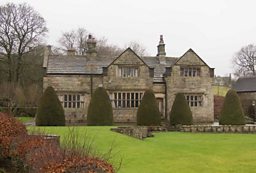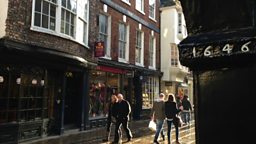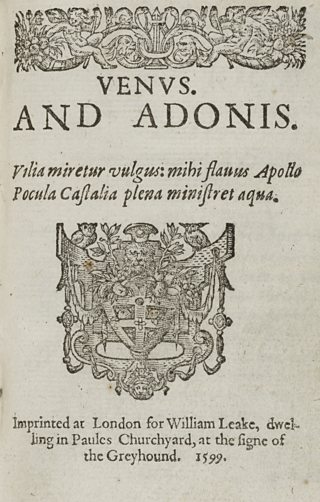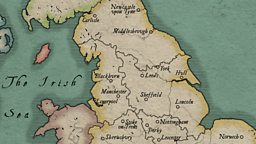Interval show lands pair in jail
On a winter’s night in a remote area of outstanding natural beauty just north of Harrogate a relatively new Shakespeare play, Pericles, was being performed.
But what could have been an idyllic evening’s entertainment was to have disastrous consequences for the owners of an Elizabethan Hall.
-
![]()
Much ado near me
Hear more Shakespeare stories on BBC Radio York
-
![]()
Shakespeare Festival 2016
The BBC celebrates the genius of the bard

What happened that night was to lead to the owners of Gowthwaite Hall – Sir John Yorke and his wife Lady Juliana – to be jailed for three years for allowing a seditious play to be performed.
We know Pericles was among the evening of drama because it was mentioned in an ensuing court case which resulted from the performance that night of February 2, 1610. King Lear was also mentioned – however it was the first recorded production of Pericles which had just been printed the year before; showing just how quickly and how far Shakespeare’s reputation had spread, even within his own lifetime.
Sir John was a conforming member of the Protestant church – though maybe not so enthusiastically – while his wife was a Catholic.
The evening performance by some travelling players was at a time when religious tensions were high, following the Gunpowder Plot on Parliament in 1606. King James I had introduced tough new measures to root out Catholicism, including forcing them to commit to an oath of allegiance to taking Communion, to the Protestant Church and its King. Those who refused became known as ‘recuscants’.
Away from London there were areas of staunch Catholicism. On this particular night in Yorkshire the travelling players were led by two Catholic shoemakers, Robert and Christopher Simpson.

Dr Siobhan Keenan, Reader in Shakespeare and Renaissance Literature, De Montfort University, Leicester, takes up the story:
Around Candlemas (2 February) 1610, a troupe of players led by Catholic shoemakers, Robert and Christopher Simpson is alleged to have performed Pericles and King Lear at Gowthwaite Hall in Nidderdale. The Elizabethan Hall does not survive to the present (standing on a site now beneath Gouthwaite reservoir) but in 1610 it was the home of Catholic-sympathiser and alleged Gunpowder Plot conspirator, Sir John Yorke. It is almost certain that Pericles was Shakespeare’s play of the same name and a good chance that Lear was his King Lear, plays printed in 1609 and 1608, respectively.

We are not sure how the Yorkshire shoemakers gained copies of Shakespeare’s recently printed plays. They might have been given them by a local patron or bought them on a trip to London. But it’s perhaps more likely that they purchased them from one of the booksellers in nearby York, such as John Foster, who we know stocked contemporary literature, including plays.
The Simpson players appear to have been more renowned for performing ‘popish’ dramas. Why they should also have wanted to perform recently published plays is more intriguing. Such dramas were fashionable and performing them was perhaps a way of inviting comparison with the professional players. But the company’s reputation for performing such drama could conceal another reason for their acquisition of the plays in question. Both have a potential appeal for Catholic audiences. Pericles can be read as a kind of saint’s play in which loss and suffering gives way to miraculous redemption, while in King Lear all the good characters are suffering from exile, banishment, disinheritance and persecution of a kind that Jacobean Catholics might be expected to relate to, as literary scholar Peter Milward has pointed out. So the shoemakers could have been using Shakespeare’s plays to reflect on their position as Catholics in Protestant England, although their track record of performing in Protestant as well as Catholic households suggests that they may have been theatrical opportunists, as much as religious propagandists.
Whatever their motives, the fact that the Simpsons owned Shakespeare’s plays is a sign of how far his reputation and his works extended beyond the metropolis even in his own lifetime.

The Star Chamber
The Court Case was held by the so-called Star Chamber in London, with records of the hearing now held in the National Archives.
They reveal that the events that night had caused one or more members of the invited audience to alert the authorities for the alleged exhibition of Catholic sympathies.
The controversial play performed that evening which caused all the subsequent fuss was not Pericles, but a play about ‘St Christopher’ which was being staged around the same time. During the interval the players were alleged to have inserted an interlude in which a Protestant minister was out-performed by a Catholic priest, and then carried off to hell!
When the case came before the Star Chamber, Pericles and King Lear were mentioned – which neatly dates the fact they were being performed at this time…and it was the first mention of Pericles in performance.
The court fined the couple £1,000 each and sent them to debtors’ prison for three years.
Shakespeare on Tour
From the moment they were written through to the present day, Shakespeare’s plays have continued to enthral and inspire audiences. They’ve been performed in venues big and small – including inns, private houses and emerging provincial theatres.

BBC English Regions is building a digital picture which tracks some of the many iconic moments across the country as we follow the ‘explosion’ in the performance of The Bard’s plays, from his own lifetime to recent times.
Drawing on fascinating new research from Records of Early English Drama (REED), plus the British Library's extensive collection of playbills, as well as expertise from De Montfort University and the Arts and Humanities Research Council, Shakespeare on Tour is a unique timeline of iconic moments of those performances, starting with his own troupe of actors, to highlights from more recent times. Listen out for stories on Shakespeare’s legacy on your BBC Local Radio station from Monday 21 March, 2016.
You never know - you might find evidence of Shakespeare’s footsteps close to home…
Craig Henderson, BBC English Regions
Bard's fame boosts Yorkshire book sales
Shakespeare’s works did not only enjoy a life on the London stage or on the capital’s bookstalls in his own lifetime. We know that at least some regional booksellers also stocked and sold Shakespeare’s works. This includes one of the booksellers in Jacobean York, John Foster. When Foster died in the same year as Shakespeare (1616), his papers included an inventory of his stock. This included 27 playbooks, worth four pence each and a copy of the newly published Workes of Ben Jonson (1616).

No plays are named individually in the inventory but they might well have included Shakespeare’s, as he was then the most famous playwright working for the London theatres and we know that his plays had been bought and were being performed locally by at least one Yorkshire-based acting company.
Foster definitely stocked other Shakespearean literature, the inventory including copies of Shakespeare’s erotic poem, Venus and Adonis (1593), and The Passionate Pilgrim (1599), an anthology of poems attributed to Shakespeare and including some of his sonnets.
That Foster stocked work by Shakespeare is an indication of how far his reputation had spread beyond London – as a poet as well as a playwright – even in his own day and of the appetite there implicitly was to read his works beyond the early modern capital. We don’t know who bought copies of Shakespeare’s titles from Foster but his list of debtors included people not just from York but living ‘in a thirty-mile radius round the city’ so that Shakespeare’s works may have been read and on the bookshelves of houses across Jacobean Yorkshire.
Authored piece by Dr Siobhan Keenan, Reader in Shakespeare and Renaissance Lit, De Montfort University

Related Links
Shakespeare on Tour: Around York
-
![]()
The 18th century impersonator who was 'the Jon Culshaw of his day'
The city gets its prestigious Theatre Royal
-
![]()
Famous theatre impresario bows out in Scarborough
Stephen Kemble says goodbye to the theatre
-
![]()
Clamoring crowds wreak havoc at Guildhall
The King's Men return to the popular performance destination
Shakespeare on Tour: Around the country
-
![]()
Ira Aldridge
Ira Aldridge - the first black Shakespearean actor
-
![]()
Blossoming at the Rose Theatre
Shakespeare, budding playwright and actor, at the Rose Theatre from the spring of 1592
-
![]()
Will Kemp dance finished in Norwich
Why did Will Kemp, Shakespeare's former clown, dance from London to Norwich?
-
![]()
London's Female Romeo
Charlotte Cushman, the American actress who took Victorian London by storm









